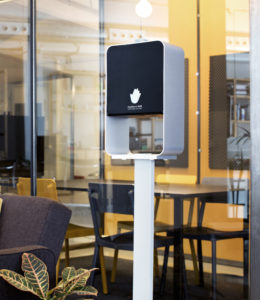[ad_1]
Not only has the coronavirus pandemic increased consumer demand for hand sanitizer among consumers, but businesses have also significantly ramped up their purchases, too. Businesses want the alcohol-based gel that fights infectious agents to help prevent the spread of the new coronavirus in the workplace.
Recognizing businesses’ growing demand for hand sanitizer, Touchland, a supplier of its own brands of hand sanitizer and dispensers, decided to expand its ecommerce sales channel from direct-to-consumer to include B2B sales. As part of the process, Touchland made its KUB hand sanitizer dispenser its flagship product for its new B2B ecommerce channel.
Meeting the new rush for hand sanitizer

Ed Krafcik, head of business development, Touchland
“We had been selling KUB (pronounced cube) to companies such as Chase Bank and [outdoor clothier] Canada Goose, which were putting KUB in their retail locations, but with COVID-19 accelerating demand for the hand sanitizer, and our B2B customers looking for a more digitally native purchasing experience, we decided to build out the B2B side of our business by creating the Touchland for Business website,” says Ed Krafcik, head of business development for Touchland. “A lot of the companies we are selling to have never purchased hand sanitizer prior to COVID-19.”
Touchland lists among its B2B customers retail chain Target Corp., fashion brand Louis Vuitton, Standard Hotels, mobile payments firm Square Inc., Google LLC, and the Equinox Group, which operates multiple health and fitness brands. Other Touchland clients include real estate investment firm Beacon Capital Partners, real estate developer RXR Realty, coffee manufacturer and retailer Blue Bottle Coffee Inc., and juice bar chain Joe and the Juice.
Touchland decided to make KUB the flagship product for its B2B ecommerce channel to build consumer awareness of the product in 2020, Krafcik says. The KUB is a hand sanitizer dispenser that combines “aesthetic design” and “smart technology” that tracks the number of doses used per cartridge. The dispenser links to an app that businesses can download to a mobile device or computer to receive notifications when a cartridge or the batteries that power the KUB need to be replaced. Automatic notifications eliminate the guesswork for replacing a cartridge or batteries, as well as the need to visually inspect the dispenser to make those determinations, which makes the cost per dose more economical, Touchland says. The app can monitor up to 20,000 dispensers simultaneously.
Connecting to the IoT for efficiency

A Touchland KUB hand sanitizer dispenser.
“A lot of the time, cartridges in dispensers are replaced when there are still several doses left,” Krafcik says. “Connecting the KUB to the Internet of Things, ensures all doses are used prior to cartridge replacement.”
Businesses can analyze dosage and refill patterns to determine how often they need to reorder cartridges through the Touchland website and set up automatic reorders, such as once or a month or every two months. “This helps users predict their future refill needs,” Krafcik says.
Touchland, which launched in the United States in 2017 as a direct-to-consumer brand, projects its B2B channel will grow to 75% of its business by 2021. B2B orders range from $1,500 to $20,000, on average. Buyers can pay for their purchase using a credit card or via the ACH. As its B2B business grows, Touchland is targeting large B2B buyers that typically purchase on net terms.
Touchland was founded in 2010 in Barcelona, Spain, by CEO Andrea Lisbona, whose vision is to take hand hygiene to a higher level. Upon entering the U.S. market, Touchland partnered with the Zobele Group, a multinational manufacturing company, to produce its dispensers. In addition, Zobele has invested in Touchland.
Disrupting and innovating
“We believe Touchland is disrupting, and will ultimately innovate a massive world-wide industry: personal sanitization,” Zobele CEO Roberto Schianchi says in a prepared statement on Touchland’s website. “After much deliberation, our company chose to back the growth potential of Touchland by not only providing highly-scalable, exclusive manufacturing and logistics services, but also placing a substantial cash investment during the company’s founding stages.”
In addition to its goal of taking hand sanitation to a higher level, Touchland says it allocates 5% of its profits to send its sanitizing hygiene solutions to developing countries where water is scarce and many children die daily from diarrheal diseases caused by a lack of safe water, sanitation and basic hygiene.
Future plans for Touchland’s B2B ecommerce channel include integrating an ordering feature into its app that links users to their account. One of the challenges to making this option a reality, Krafcik says, is managing the purchasing restrictions companies place on employees or retail locations. For example, a retail chain may not enable individual stores to place orders. Instead, those orders must be placed at the corporate level.
“The goal is to have in-app ordering in 2021,” says Krafcik.
Peter Lucas is a Highland Park, Illinois-based freelance journalist covering business and technology.
Sign up for a complimentary subscription to Digital Commerce 360 B2B News, published 4x/week, covering technology and business trends in the growing B2B ecommerce industry. Contact editor Paul Demery at paul@digitalcommerce360.com and follow him on Twitter @pdemery.
Follow us on LinkedIn and be the first to know when new Digital Commerce 360 B2B News content is published.
The post Hand sanitizer demand leads to a new B2B ecommerce channel appeared first on Digital Commerce 360.
[ad_2]
Source link


